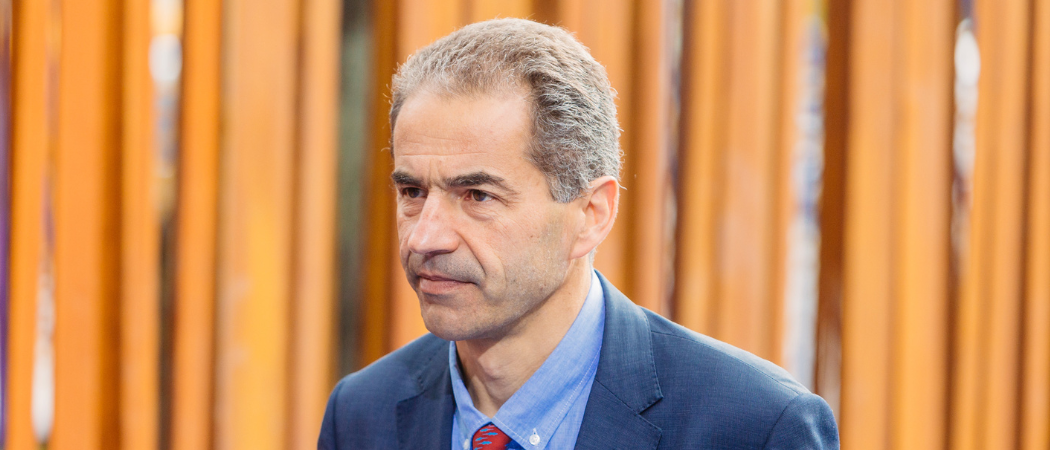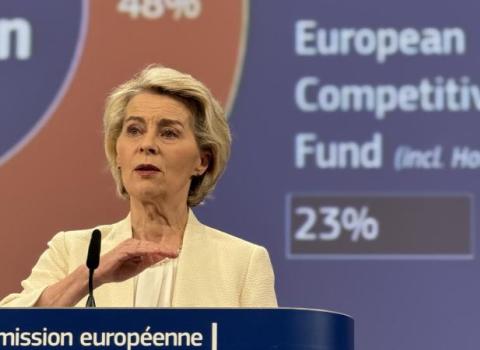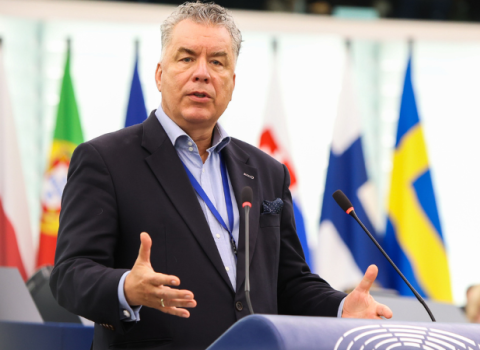Some recommendations about the EU’s next research Framework Programme have been followed, but others ignored, at least for now

Manuel Heitor, former Portuguese research minister. Photo credits: Estonian Presidency of the Council of the European Union / Flickr
Last week, the European Commission unveiled plans for the next €175 billion iteration of Horizon Europe, set to run from 2028 until 2034. Researchers’ organisations across Europe are now combing the fine print to see whether it meets expectations.
The Commission’s own advisors, which set out how the programme should change in a report last year, say they’re pleased in parts. But some of their recommendations have been ignored, and they warn that a few ideas put forward by Brussels are downright alarming.
“There are some positive signs,” said Manuel Heitor, the former Portuguese science minister who chaired a group of 15 experts who drew up the report, called Align, Act, Accelerate, last year.
But he called proposed changes to the governance of the European Research Council (ERC) “very worrying” and said they seemed designed to make the council’s president “a nobody.”
Science|Business spoke to Heitor and other members of the expert group to see whether the Commission’s plans match up their recommendations.
Recommendation: provide increased, better focused and ring-fenced funding across the full spectrum of research, development and innovation. This requires an increase in the budget for the next Framework Programme to €220 billion.
The Heitor group is breathing a sigh of relief that there is even a separate research Framework Programme at all, after discussions in Brussels initially considered subsuming it into a bigger, politically controlled European Competitiveness Fund.
“I'm most pleased about the proposal to have a ring-fenced budget,” said George Schütte, chief executive of the Volkswagen Foundation, a private German research funder, and member of the Heitor group.
However, the Commission’s €175 billion budget proposal, while better than some feared, falls a long way short of the €220 billion recommendation. What’s more, if negotiations with member states play out like they did for the current Framework Programme, this €175 billion budget will be reduced by a quarter.
The €175 billion proposal is a “significant increase,” said Heitor, “though not as much as we recommended.”
According to Schütte, the €220 billion recommendation was not plucked out of thin air. This sum is needed to fund all proposals to the ERC and European Innovation Council (EIC) rated as excellent, he said. €175 billion “would probably not be enough,” he said.
Recommendation: establish an experimental unit to test new programmes and instruments with fast time to funding (e.g. innovation prizes, Advanced Research Projects Agencies (ARPA) type programmes, AI tools, innovative methods for identifying and reviewing proposals).
To test out radical, new ways to fund research, Heitor’s group wanted the EU to establish an “experimental unit,” not just in FP10 from 2028, but as soon as possible. A member of Heitor’s group, Sylvia Schwaag Serger, president of the Royal Swedish Academy of Engineering Science, recently warned that the EU was lagging behind other countries when it came to experimenting with and measuring fresh funding ideas.
“Our R&D spending tends to be more conservative and risk averse” than other countries, said Serger. “This is why [. . .] we proposed that the Commission establish an experimental unit to develop and test new approaches and instruments for funding.”
However, there’s no mention of this unit in any of the FP10 plans put out last week.
This is the biggest single absence in the Commission’s proposals, says Mark Ferguson, one of the expert group, and former EIC board member. He wants this unit set up, in particular to respond to the “major new opportunities (and threats) presented by artificial intelligence,” which the group outlined at length in its report.
Heitor is hopeful that the experimental unit, which he thinks should be nestled in the EIC, will be added later as the plans are fleshed out. For now, the proposals are “very, very general,” he said.
Recommendation: preserve the nature and expand the success and budgets of the ERC, EIC and Marie Skłodowska-Curie Actions (MSCA) doctoral and postdoctoral training programme.
Under the Commission’s proposals, as per the Heitor group’s recommendations, both the ERC and EIC are in line for hefty budget increases. The ERC’s budget should grow from €16 billion in the current programme to around €31.2 billion, while the EIC’s will swell even more dramatically, from €10.1 billion to €34.5 billion. These councils are the budget winners, while funding for big research consortia will grow at a slower rate.
“It’s good to see support for the ERC, MSCA and EIC [and] very important to have a significant budget increase, especially for the EIC,” said Ferguson.
But Heitor sounds an alarm over what he sees as a deliberate weakening of the ERC president, who would have their term reduced from four years to two years, renewable once.
“In two years, you do not have the time to make yourself visible in Brussels in a real way,” Heitor said. “On top of that, it would give the European Commission the opportunity to get rid of a too active president.”
“For me, the goal is very clear: to make the ERC president a nobody,” he said.
Recommendation: introduce disruptive innovation programmes into the EIC, together with the capacity to attract more private co-investment of disruptive ideas and firms.
Heitor’s report wanted the EIC become more like one of the US’s Advanced Research Projects Agencies (ARPAs), which entrust powerful programme managers with big budgets and the power to create breakthrough technologies, plus the leeway to pursue ideas that might not come off.
The EIC does have programme managers, but Heitor’s group pointed out that EU budget rules mean they don’t have anywhere near the freedom of their US counterparts. Committees, rather than the programme managers, decide which start-ups get funding.
The Commission’s FP10 plans nod to the ARPA idea, but without many details, yet. The EIC will be expanding with “more ‘ARPA’ elements into its operations, where high-risk projects are supported in stages, or discontinued, based on their potential to deliver on disruptive solutions as assessed by expert programme managers,” the proposals say.
Schütte, who was a leading research civil servant when Germany created its own Sprind innovation agency five years ago, stressed that trying to turn an existing funder into an ARPA-like agency probably won’t work, as institutional cultures are so stubborn.
So instead of trying to “radically change” the EIC, he suggests setting up a pilot “semi-independent” entity to play with APRA-type funding ideas.
Recommendation: create an Industrial Competitiveness and Technology Council to effectively engage eminent practitioners and experts who will ensure the Framework Programme’s attractiveness and relevance to industry.
One of the Heitor group’s big ideas was to make Pillar 2 of Horizon Europe, which funds pan-European consortia of academics and businesses, with a proposed budget of €75.9 billion, freer of the Commission. Instead, it should be steered, rather like the ERC and EIC, by independent experts, including those actually working on new technologies. Aside from an industry-focused council, the group also wanted to see a societal challenges council set up, focusing on things such as democracy and mental health.
Under the Commission’s plans, this recommended split between “competitiveness” and “society” research will be put into practice.
However, Pillar 2 funding will still be dished out by the Commission, rather than independent experts. Indeed, it could come under even tighter control by Brussels, because Pillar 2 under the new Framework Programme is supposed to follow the priorities of the European Competitiveness Fund, a €410 billion grab-bag of other programmes consolidated together into order to make funding more coherent.
Related articles
- Commission puts forward €175B budget for FP10
- EU ‘lagging behind’ on new approaches to research funding
- News analysis: EU needs to experiment with new R&I funding mechanisms, Heitor report says
For Heitor, this is a problem, because control of Pillar 2 by the Commission, and haggling over grant calls by member states, has led to the frittering away of money on too many small projects, with pitiful sums going to each consortium partner, rather than anything that could seriously move the dial on European technological might. “To avoid that, we need an independent governance,” he said.
Recommendation: require member states to make ambitious national plans and investments.
Given that some EU states invest far more public money in R&D than others, the Heitor group wanted to see the Framework Programmes give laggards a push to invest more of their own money.
And it looks like this will happen from 2030. Widening countries – those with weaker science systems - will only be eligible for top-up Horizon Europe money if they have boosted their national R&D budgets the previous year.
“We need incentives,” concurred Schütte.
Recommendation: eliminating non-core, redundant and underperforming programmes, e.g. the European Innovation Ecosystems and European Institute of Innovation and Technology (EIT).
The future role of the EIT is still to be defined. While the proposal does not specifically mention the institute, under Pillar 3 there is a short reference to innovation ecosystems and the integration of the “knowledge triangle” of education, research and innovation, and business, which has traditionally been the EIT’s mission.
The current regulation establishing the EIT gives the Commission until the end of 2026 to make provision for its budget beyond 2027, if required by Horizon Europe. However, the Commission sees this as an obligation, with officials confirming this month that it will present a proposal for the EIT’s continuation by the end of next year.
Recommendation: adopting a portfolio approach to agile project funding that accepts responsible risk in return for reduced administrative burden and transaction costs. This requires a radical reform of the application system to “trust first/evaluate later” and become more applicant-friendly, Commission-efficient, and impact-oriented and to ensure a reduced time to fund.
Winning Horizon Europe grants has become a “nightmare,” said Heitor, because of the labyrinthine complexity of applications. Scientists have to “subcontract consulting firms to produce their applications because they are so complex.”
It also takes an average of 240 days from when calls close to when a grant is signed, a wait that is significantly longer than under the previous Framework Programme, Horizon 2020. These delays are “impossible,” said Heitor. “We need to go much, much faster.”
To address this, the Commission says that there will be a maximum wait of seven months between a call closing and grants being signed, one month quicker than the current target of eight months. There’s also a promise to simplify application procedures.
Recommendation: have less prescriptive calls across the Framework Programme as an efficient and predictable instrument to capture opportunities in the uncertain and fastmoving scientific, technology and business environment.
The Commission’s proposal agrees that Horizon Europe need much less micromanagement written into grant calls, allowing researchers more leeway to propose out-of-the-box solutions to problems.
It promises “less prescriptive programming: reducing the overall number of topics, shortening topic descriptions and minimising single-project topics.” Call topics will be “open” by default, “less prescriptive” and with “more freedom to applicants for different pathways towards expected outcomes.”
Recommendation: embrace the fact that dual use occurs naturally given the ubiquitous nature of modern technology (e.g. AI, material science, the internet, drones) and the broad needs of a modern military (e.g. health, fitness).
Heitor’s suggestion to broadly allow dual use technology appears to have been straightforwardly accepted by the Commission, as widely anticipated. FP10 will be “dual use by default,” research Commissioner Ekaterina Zaharieva said on July 17 explaining the plans. However, the legal text itself is less clear and stakeholders are awaiting clarifications.





 A unique international forum for public research organisations and companies to connect their external engagement with strategic interests around their R&D system.
A unique international forum for public research organisations and companies to connect their external engagement with strategic interests around their R&D system.